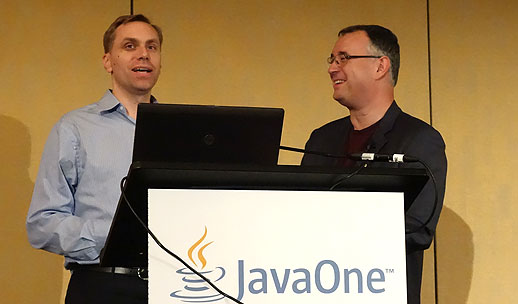This article is more than 1 year old
AMD, Oracle sweep their glasses off the table, ARM wrestle Hadoop for the data center
64-bit Cortex-A57 takes on elephant in the room
JavaOne AMD thinks the future of the data center lies in the ARM processor architecture, and it's betting that servers based on 64-bit ARMv8 will be humming in racks near you sooner than you expect.
To prove it, AMD's Leendert van Doorn took to the stage at Oracle's JavaOne conference in San Francisco to demo two ARM Cortex A57–based servers running Hadoop, marking the first time that's been done publicly.
These weren't highly customized, purpose-built servers, either. They were loaded with two different Linux distros – Red Hat and OpenSuse – with two different versions of the Linux 3.x kernel and a recent test build of Oracle's standard Java Development Kit (JDK).
Van Doorn was joined onstage by Henrik Stahl, Oracle's Java Internet of Things man, who explained that getting Java running well on 64-bit ARM servers was important for Big O because something like 50 per cent of all server workloads today run on the tech.
"Even though Oracle, for its own products, has very, very slow uptake – we don't adopt new technologies very quickly – we are very keen on enabling partners that come out with new technologies to be able to get a foothold in the market," Stahl said, "and Java enablement is the first step of that."

Left to right: Oracle's Henrik Stahl and AMD's Leendert van Doorn
Stahl said Oracle's Java for ARM is currently in private beta but a public early access version will ship later this year, with the goal of hitting general availability in the first half of 2015. While there are still a few pieces missing, he said, switching to ARM should be seamless for Java developers.
"I don't see any reason why a developer using this would see anything different from running an x86 system," Stahl said.
He added that Oracle has been working with AMD, Applied Microsystems, and Cavium to get Java running on their ARM systems-on-chips (SoCs) and that it has "had no issues" with the AMD hardware it has had access to for the last couple of months.
Tuning the silicon for the software
But what really makes ARM interesting for the server market, van Doorn said, is the prospect of application-optimized servers, where their hardware includes "accelerators" for specific workloads, something that hasn't really been economically feasible in the past.
These accelerators might include special silicon designed to speed up cryptography, networking, image processing, or any number of functions, van Doorn said – and ARM's model makes them easy to integrate.
"The ARM ecosystem, because they have an open bus architecture and an open infrastructure, it's really easy for them to pick those accelerators up," he added. "I fully expect there will be a large number of startups doing fixed-function accelerators around all sorts of workloads, and some of them will be really interesting to integrate into an SoC."
One of the more common types of accelerator is a GPU, van Doorn said, which is really just a vector-processing unit. To illustrate how software can be tuned to work with accelerators, he pointed to AMD's work on HadoopCL, which offloads some Hadoop query processing to the GPU via OpenCL.
The Heterogeneous System Architecture (HSA) consortium – of which AMD, ARM, and Oracle are all members – is working to make it easier for chipmakers to adopt more types of accelerators, van Doorn said. And because certain workloads – such as search – have become so important to companies operating massive-scale data centers, he added, the resulting silicon will be cost effective.
"There are not just business trends that are driving there; there are also technology trends," van Doorn observed, noting that simply producing faster and faster general-purpose processors isn't as easy as it once was. "The cost of actually producing denser and denser silicon is going up, instead of going down." ®
